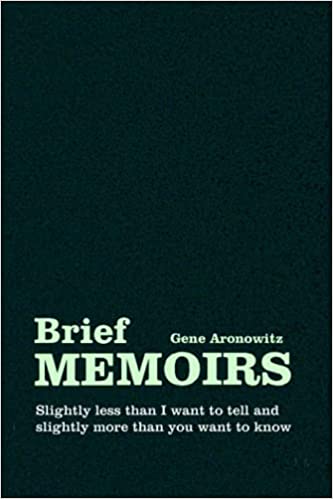Thirty Minutes of Fame
By Gene Aronowitz
A well-known quotation wrongly attributed to Andy Warhol states, “In the future, everyone will be world-famous for 15 minutes.” I’m yet to be world-famous, but I did have two periods of pretty substantial notability during my yet-to-be-completed lifetime. The first of these was in 1978.
I had been Deputy Commissioner of Social Services in Westchester County, New York for three years and believed it was time for me to have a more responsible position. The county’s mental health operation had been reorganized and a search was underway to recruit a commissioner to head the new Department of Community Mental Health. I asked for an appointment with Alfred DelBello, the County Executive. During our two-minute meeting, he said he would certainly consider me for the job.
I was a little put off by being dismissed so quickly, but DelBello had a lot on his mind. The United States Department of Labor had issued a report citing “major deficiencies” in the County’s $35 million federally funded CETA (Comprehensive Employment and Training Act) program. The aim of the program was to help those who were unemployed or underemployed by offering them jobs in public agencies or not-for-profit organizations to develop marketable skills and move on to unsubsidized employment.
Aside from the critical report from the government, the District Attorney was investigating what he called “pervasive corruption” in the program, including nepotism and misuse of funds. To make matters worse, one of the New York City television stations, Channel 4, had assigned an investigative reporter to see what was happening. Unfortunately, the Director of the CETA program ignored him, which so irritated the journalist and the station that their frequent reports were blistering. The County Executive was vulnerable because the CETA Director was a long-time friend of his, who had worked with him as he rose politically.
A few days after we met, the County Executive asked me to take over the program and do whatever was necessary to get it under control. I saw his request as a potentially prolonged and perilous job interview. If I screwed up, I could forget about the promotion. However, if I stopped the scandal and improved the program, my prospects would be excellent. I wanted that job, badly, accepted the challenge, and was appointed Acting Director of the CETA program, on partial leave from my Social Services position.
The New York Times article announcing my appointment referred to me as “an expert in managing Federal programs.” That was a bit hyperbolic, but I was a confident manager. Another Times article called me “a thorough administrator who has gained the respect of many in and out of county government.”
I recruited a small team of specialists in human resources and data analysis to help me reorganize the program. We established new, more efficient procedures and created overly stringent internal controls to assure the federal government and the media of our resolve. Many agency administrators objected to those controls, but they seemed essential to me. I thought that satisfying the media was vital because scandals can balloon if not extinguished quickly. I decided to provide unfettered access to the press. Consequently, there was continuous newspaper, radio, and television coverage regarding the program’s restoration. About a month after my appointment, a colleague said, “A strange thing happened today. I didn’t see your name in the paper.” A column in a local paper noted, “Friends used to call him Gene Anonymous but Pleasantville resident Dr. Eugene Aronowitz has lately become a prominent figure in Westchester news.
But then, the news took a turn. An article about the search for the Commissioner of Community Mental Health position stated, “One name recently mentioned is that of Eugene Aronowitz, a deputy social service commissioner...” Two weeks later, a column describing my work with CETA read, “Dr. Aronowitz’s name has now come up in a new context, as a candidate to head up the new Department of Community Mental Health under the County Executive." The following month, I was appointed.
Five years later, in February 1984, my second fifteen minutes of fame commenced.
Five teenagers in our area killed themselves within 30 days. As the senior mental health official in the county, I had to respond to almost continuous press inquiries. There was intense interest, not only locally, but throughout the country. NBC Network News and the major New York City television stations interviewed me. The wire services, including the Associated Press (AP) and United Press International (UPI), spread the story. Newspaper articles featuring my comments appeared in Arizona, California, Colorado, Florida, Georgia, Illinois, Iowa, Kentucky, Louisiana, Massachusetts, Montana, New Jersey, Ohio, Pennsylvania, Vermont, Virginia, South Dakota, and Texas.
I enjoyed the celebrity and, at times, even exaggerated it. Once, I offered a ride to a colleague when I drove up to Albany for a meeting. When my car approached the Tappan Zee Bridge, the toll taker reached for my money and said, “Oh, hi, Mr. Aronowitz.” I nodded and smiled. My passenger’s face betrayed his admiration for me as he remarked about how well-known I had become. I shrugged, giving him the impression that this happened all the time. I never let on that the toll taker was a teenager who lived in the cul-de-sac behind our house. Shameful, I know, but at the time, hilarious and exhilarating.
But memoir writing is often sobering when pursued thoughtfully and honestly. While producing the suicide segment of this piece, my delight with all its consequent recognition began to bother me. I realized that my prominence was way out of proportion to what I had actually done. True, my involvement with the press certainly had value. The public needed to know that there was direction and purpose in the government’s effort to deal with this issue. But the media attention resulted from alarm and compassion for those poor dead kids and their grieving parents and friends. They are what made the story so important and compelling. It was unsettling to acknowledge that my brief celebrity, my second fifteen minutes of fame, blossomed because of such misfortune.


